Would a SalvinI do well in my tank
- Thread starter Carter020108
- Start date
You are using an out of date browser. It may not display this or other websites correctly.
You should upgrade or use an alternative browser.
You should upgrade or use an alternative browser.
It could work, but IMO it would be pushing it, in a 180 gallon, if they are small there chances are better...
The size tank should be adequate for those 4 sized cichlids. But.....
The potential problem that jumps out to me, is all 3 cichlid species similar body shape, similar color patterns (especially the iridescent spots) and similar feeding mechanisms (mouth shape), suggesting similar feeding regimes.
Because they all look so similar, the problems associated with territoriality may become enhanced at maturity.
When trying to construct a cichlid community, I find combining cichlids with "dissimilar" shapes, colors, feeding preferences (mouth shapes) etc etc seem to offer the best chances of success.
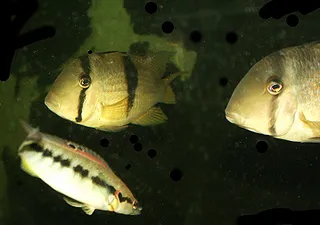
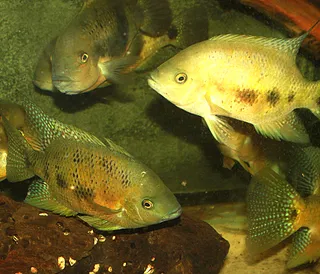
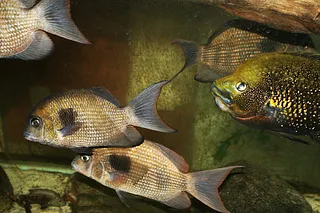
Above are 3 geographically diverse cichlid communities that worked for me.
left, S American Crenicichla with Guianacara, body and mouth shape, color patterns radically different allowed for them to ignore each other in a 150 gal.
middle, different body, and mouth shape indicated that these Central Americans, had totally different feeding preference, so problems were few, although at maturity they easily outgrew a 6 ft tank. The bocourti vegetarian, intermedia insectivorous, and mollucavores.
and same on the right in a Madagascan cichlid community, different body and mouth shapes, different colors kept them peaceful, although again, at maturity they needed a much larger enclosure that a standard 6 foot tank. The Paretroplus snail eaters, Paratilapia generalized predators
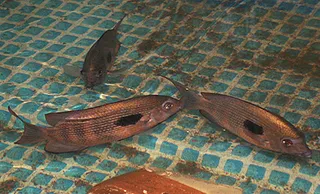
Above, the Madagascans required a minimum 400 gal enclosure in the end. and did fine until
I tried introducing 2 different (but similar appearing) species of Paratilapia in the 400 gal pool, and they sought each other out in that space (as competitors), eventually requiring separate quarters.
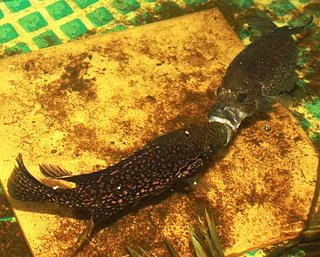
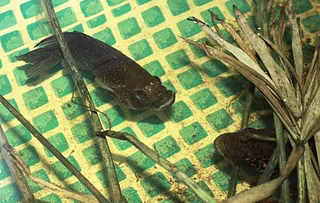
The potential problem that jumps out to me, is all 3 cichlid species similar body shape, similar color patterns (especially the iridescent spots) and similar feeding mechanisms (mouth shape), suggesting similar feeding regimes.
Because they all look so similar, the problems associated with territoriality may become enhanced at maturity.
When trying to construct a cichlid community, I find combining cichlids with "dissimilar" shapes, colors, feeding preferences (mouth shapes) etc etc seem to offer the best chances of success.



Above are 3 geographically diverse cichlid communities that worked for me.
left, S American Crenicichla with Guianacara, body and mouth shape, color patterns radically different allowed for them to ignore each other in a 150 gal.
middle, different body, and mouth shape indicated that these Central Americans, had totally different feeding preference, so problems were few, although at maturity they easily outgrew a 6 ft tank. The bocourti vegetarian, intermedia insectivorous, and mollucavores.
and same on the right in a Madagascan cichlid community, different body and mouth shapes, different colors kept them peaceful, although again, at maturity they needed a much larger enclosure that a standard 6 foot tank. The Paretroplus snail eaters, Paratilapia generalized predators

Above, the Madagascans required a minimum 400 gal enclosure in the end. and did fine until
I tried introducing 2 different (but similar appearing) species of Paratilapia in the 400 gal pool, and they sought each other out in that space (as competitors), eventually requiring separate quarters.


I agree with Duanes. Though I've never considered stocking compatibility in terms of fish body type and niche, what Duanes said is true for my tanks as well. I've found that the midwater/topwater predatory haps and peacocks in my tank ignore the bottom-dwelling algae grazing mbuna and the vice versa is true as well.
I agree,I agree with Duanes. Though I've never considered stocking compatibility in terms of fish body type and niche, what Duanes said is true for my tanks as well. I've found that the midwater/topwater predatory haps and peacocks in my tank ignore the bottom-dwelling algae grazing mbuna and the vice versa is true as well.
I have had similar success with African cichlids, with colors, body shapes, and place in the water column preferences
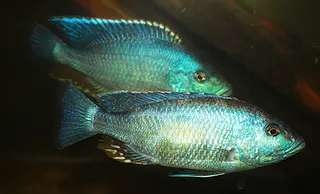
Those that prefer open water, when combined with substrate huggers, have also been successful in my tanks.
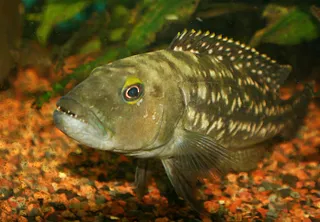
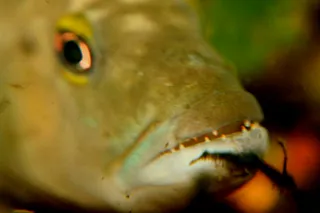
Even though ferocious looking Lepidiolamprologus, almost completely ignored the brightly colored, open water swimmers like Nimbochromis.
And in my Lake Barumbi mbu biotope, predetory Stomatepia (with almost Parachromis type jaws) would ignore other species from the lakes
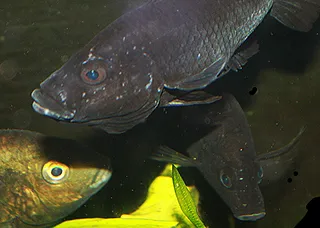
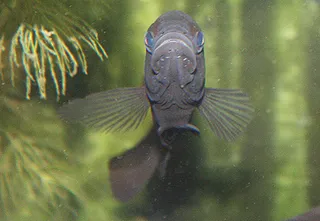
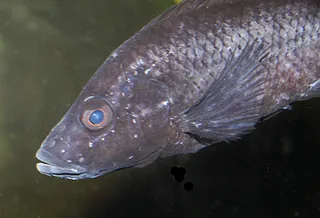
With opposing shapes and colorations, because they fed on different things in the lake.
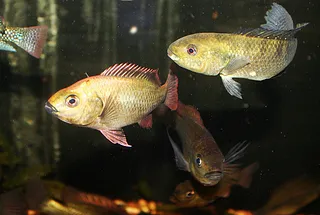
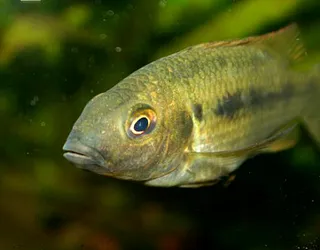
These preferences are not lost in a tank, they are instinctual, and may become even more pronounced in the confines of the limited space in most aquariums.
I would recommend keeping cichlids that swim in the open water instead of those that hide in caves/are territorial.
Though my experience with salvini is limited to 2 years, I've found them to always stake out a territory, whether it's a piece of decor or a corner of a tank and defend it.
Hence, I'd recommend not getting cichlids that fill that niche of claiming a spot as territory, because that may result in fights. I'm not sure there are many American cichlids that swim in the open water, but that's why I keep salvini with open-water swimming peacocks and haps because they occupy completely different niches and hence rarely interact with each other.
Though my experience with salvini is limited to 2 years, I've found them to always stake out a territory, whether it's a piece of decor or a corner of a tank and defend it.
Hence, I'd recommend not getting cichlids that fill that niche of claiming a spot as territory, because that may result in fights. I'm not sure there are many American cichlids that swim in the open water, but that's why I keep salvini with open-water swimming peacocks and haps because they occupy completely different niches and hence rarely interact with each other.


